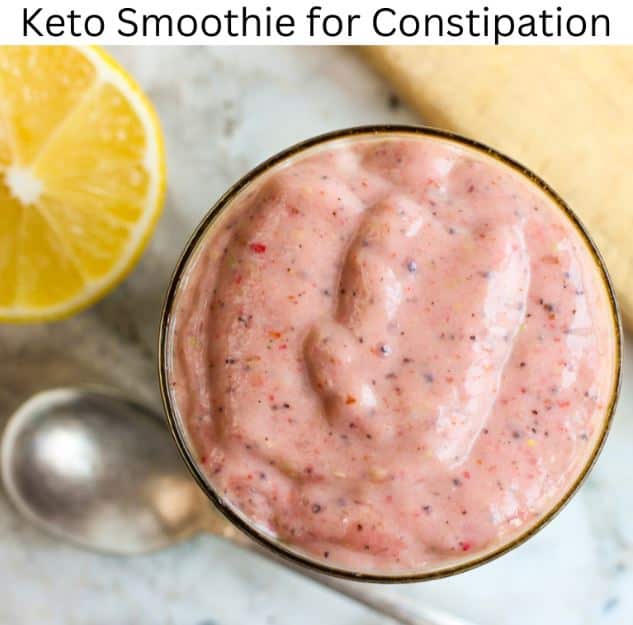Understanding the Benefits of a Keto Smoothie for Digestive Health
In today’s fast-paced world, maintaining regular bowel movements can sometimes feel like a challenging task. A great solution that has gained significant attention is the Keto Smoothie for Constipation, which is crafted using powerful ingredients that support digestive health and regularity. This smoothie combines elements that are rich in fiber, healthy fats, and electrolytes, ensuring a balanced approach to alleviating constipation. Whether you’re looking to optimize your digestion on a daily basis or need occasional relief, this recipe provides a perfect natural remedy.
The Role of Healthy Fats in Gut Health
A key element of the keto diet is its focus on consuming healthy fats, and this smoothie incorporates several sources of beneficial fats to keep you feeling satisfied while promoting gut health. Coconut oil, MCT oil, and avocado are rich in medium-chain triglycerides (MCTs), which have been shown to support gut motility and promote the efficient absorption of fat-soluble vitamins. These fats provide the body with an energy source that is easy to digest and process, which is especially important for individuals dealing with sluggish digestion.
Additionally, the inclusion of avocado in the smoothie offers more than just healthy fats. Avocados are also high in soluble fiber, which can help regulate the digestive system by adding bulk to the stool and making bowel movements smoother and easier to pass. With their creamy texture, avocados help create a smooth and enjoyable drink while contributing to improved digestive function.
Why Fiber is Essential for Digestive Regularity
One of the main reasons this keto smoothie is effective for constipation is its fiber content. Fiber is a well-known digestive aid, and the smoothie’s combination of raspberries, flaxseeds, and chia seeds provides a potent mix of soluble and insoluble fiber that can keep your digestive system moving efficiently.
Fiber plays an essential role in adding bulk to the stool, which helps move waste through the intestines. Insoluble fiber, such as that found in chia seeds and flaxseeds, works by absorbing water and adding volume to the stool, while soluble fiber from raspberries and avocado can slow digestion and absorb water, making stools softer and easier to pass.
MCT Oil and Coconut Oil: Boosting Digestion Naturally
While coconut oil has been a staple in kitchens for centuries, its benefits in digestion and gut health are often overlooked. Both MCT oil and coconut oil contain medium-chain triglycerides (MCTs), a type of fat that is metabolized differently from other fats. MCTs are absorbed directly into the bloodstream, bypassing the digestive process in the small intestine, which helps provide a quick source of energy and promotes the secretion of bile. This can improve digestion and increase the efficiency of the digestive tract. MCT oil also has natural anti-inflammatory properties that support gut health and may aid in reducing digestive discomfort.
The Importance of Hydration in Digestive Function
When creating a smoothie designed to promote digestive health, hydration is a vital component. Water is a fundamental part of the recipe, helping to soften stools and facilitate digestion. Adding coconut milk or almond milk enhances hydration and provides additional nutrients without the carbohydrates typically found in dairy milk. These milks are also rich in electrolytes, which can help maintain proper fluid balance in the body, essential for healthy digestion.
Lemons for Detoxification
The inclusion of fresh lemon juice in this keto smoothie is not just for flavor—it plays a crucial role in detoxification. Lemons are high in vitamin C, which helps flush out toxins from the liver and can improve overall digestive function. The acidity of lemon juice also stimulates the production of digestive juices in the stomach, which can enhance the breakdown of food and make digestion more efficient.
The Power of Seeds for Gut Health
When it comes to maintaining regular bowel movements, chia seeds and flaxseeds offer tremendous benefits. These tiny seeds are packed with fiber, omega-3 fatty acids, and antioxidants. Chia seeds, in particular, are hydrophilic, meaning they absorb water and expand, which helps to soften stools and make them easier to pass. Similarly, flaxseeds are rich in both soluble and insoluble fiber, making them ideal for improving overall gut health. They are also known to have a mild laxative effect, which can promote bowel regularity.
For those looking to diversify their fiber sources, basil seeds can be an excellent alternative to chia seeds. They are known for their higher fiber content, making them even more effective for improving digestion and alleviating constipation.
Part 2: Keto Smoothie for Constipation Recipe
This refreshing and nutrient-packed smoothie will help promote digestion and alleviate constipation naturally. Packed with fiber, healthy fats, and gut-friendly ingredients, it’s a perfect addition to any keto diet or low-carb lifestyle. It’s easy to prepare and will keep you feeling light and energized throughout the day.
Ingredients:
- 1 cup of your preferred non-dairy milk (almond milk, coconut milk, or macadamia nut milk). Alternatively, use 7/8 cup water with 1 teaspoon cream (add cream just before blending for best results).
- 3/4 cup frozen avocado cubes (or fresh, if preferred)
- 1/2 cup water
- 1/2 cup frozen raspberries
- 1/4 cup cooked frozen beans (such as black beans or navy beans)
- 2 tablespoons fresh lemon juice (about half a lemon)
- 1 tablespoon MCT oil or extra-virgin coconut oil
- 1 teaspoon each of chia seeds and flaxseeds (or basil seeds for a higher fiber option)
- 2 tablespoons of liquid low-carb sweetener, such as allulose (or 8-10 drops of stevia)
Instructions:
- Prepare the Ingredients: If using frozen avocado, ensure it’s already cubed. Squeeze the fresh lemon to extract the juice and set it aside.
- Blend: In a high-speed blender, combine the milk (or water-cream mixture), frozen avocado, raspberries, beans, lemon juice, MCT oil (or coconut oil), chia seeds, and flaxseeds. Add the water to adjust the consistency if desired.
- Sweeten: Add your chosen sweetener—whether it’s allulose or stevia—and blend again until smooth.
- Serve: Pour into two glasses and enjoy! This smoothie can be consumed as a quick breakfast or a refreshing afternoon snack.
Notes:
- You can adjust the consistency by adding more water or milk to make it thinner or thicker, depending on your preference.
- This recipe is great for anyone looking to improve gut health and digestion while following a keto or low-carb lifestyle.
Nutritional Information:
- Calories: 113 kcal
- Carbohydrates: 7g
- Protein: 2g
- Fat: 16g
- Saturated Fat: 1g
- Polyunsaturated Fat: 1g
- Monounsaturated Fat: 5.5g
- Sodium: 16mg





